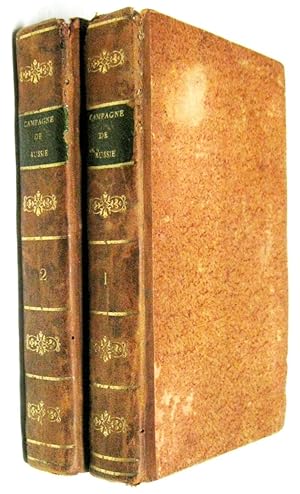segur philippe paul comte 1780 1873 (2 résultats)
CommentairesFiltres de recherche
Type d'article
- Tous les types de produits
- Livres (2)
- Magazines & Périodiques (Aucun autre résultat ne correspond à ces critères)
- Bandes dessinées (Aucun autre résultat ne correspond à ces critères)
- Partitions de musique (Aucun autre résultat ne correspond à ces critères)
- Art, Affiches et Gravures (Aucun autre résultat ne correspond à ces critères)
- Photographies (Aucun autre résultat ne correspond à ces critères)
- Cartes (Aucun autre résultat ne correspond à ces critères)
- Manuscrits & Papiers anciens (Aucun autre résultat ne correspond à ces critères)
Etat En savoir plus
- Neuf (1)
- Comme neuf, Très bon ou Bon (Aucun autre résultat ne correspond à ces critères)
- Assez bon ou satisfaisant (1)
- Moyen ou mauvais (Aucun autre résultat ne correspond à ces critères)
- Conformément à la description (Aucun autre résultat ne correspond à ces critères)
Particularités
- Ed. originale (1)
- Signé (Aucun autre résultat ne correspond à ces critères)
- Jaquette (Aucun autre résultat ne correspond à ces critères)
- Avec images (1)
- Sans impressions à la demande (2)
Langue (2)
Prix
- Tous les prix
- Moins de EUR 20 (Aucun autre résultat ne correspond à ces critères)
- EUR 20 à EUR 45
- Plus de EUR 45
Livraison gratuite
- Livraison gratuite à destination de Etats-Unis (Aucun autre résultat ne correspond à ces critères)
Pays
Evaluation du vendeur
-
Memoires Du General Cte de Segur Ed Nouv Publiee Par Les Soins de Son Petitfils Volume 2
Vendeur : PBShop.store UK, Fairford, GLOS, Royaume-Uni
EUR 24,65
Autre deviseEUR 5,75 expédition depuis Royaume-Uni vers Etats-UnisQuantité disponible : 15 disponible(s)
Ajouter au panierPAP. Etat : New. New Book. Shipped from UK. Established seller since 2000.
-
Histoire De Napoléon et de la Grande-Armée pendant l'année 1812. (2 Volumes COMPLETE)
Edité par Baudouin Freres, Bruxelles, 1825
Vendeur : Ziern-Hanon Galleries, Frontenac, MO, Etats-Unis
Edition originale
EUR 242,03
Autre deviseEUR 4,70 expédition vers Etats-UnisQuantité disponible : 1 disponible(s)
Ajouter au panierQuarter Calf Leather. Etat : Very Good. Fourth Edition. Quatrieme Edition. 2 volume set. Complete. Quarter calf leather with brown spotted marbled boards. The spine has black morocco label with gilt lettering. Mild rubbing to board and light shelf wear. The leather had worming to the top edge at the board. Gilt rulling and embossed gilt design on spine. Marbled edges. Light sporadic foxing thoughout. Text in French. Volume 1: [1-7], 8-455. Volume 2: [1-3], 4-477 + 1pp errata. Philippe-Paul, comte de Ségur (November 4, 1780 - February 25, 1873), French general and historian, son of Louis Philippe, comte de Ségur, was born in Paris. He enlisted in the cavalry in 1800, and forthwith obtained a commission. He served with General Macdonald in the Grisons in 1800-1801, and published an account of the campaign in 1802. by the influence of Colonel Duroc (afterwards duc de Frioul) he was attached to the personal staff of Napoleon. He served through most of the important campaigns of the first empire, and was frequently employed on diplomatic missions. During the campaign in Poland in 1807 he was taken prisoner by the Russians, but was exchanged at the peace of Tilsit. His brilliant conduct in the cavalry charge at Somosierra on November 30, 1808 won him the grade of colonel, but his wounds compelled him to return to France. As general of brigade he took part in the Russian campaign of 1812, and in the campaigns of 1813 and 1814 he repeatedly distinguished himself, notably at Hanau (October 1813), and in a brilliant affair at Reims (March 1814). He remained in the army at the Restoration, but, having accepted a command from Napoleon during the Hundred Days, he was retired until 1818, and took no further active part in affairs until the July Revolution of 1830. During his retirement he wrote his Histoire de Napoléon et de la grande armée pendant l'année 1812 (Paris, 2 volumes, 1824), which ran through numerous editions, and was translated into several languages. The unfavourable portrait of Napoleon given in this book provoked representations from General Gourgaud, and eventually a duel, in which Ségur was wounded. On the establishment of the July monarchy he received, in 1831, the grade of lieutenant-general and a peerage. In 1830 he was admitted to the Académie française, and he became grand cross of the Legion of Honour in 1847. After the Revolution of 1848 he lived in retirement. Size: 12mo - over 6¾" - 7¾" tall. Hardcover.



